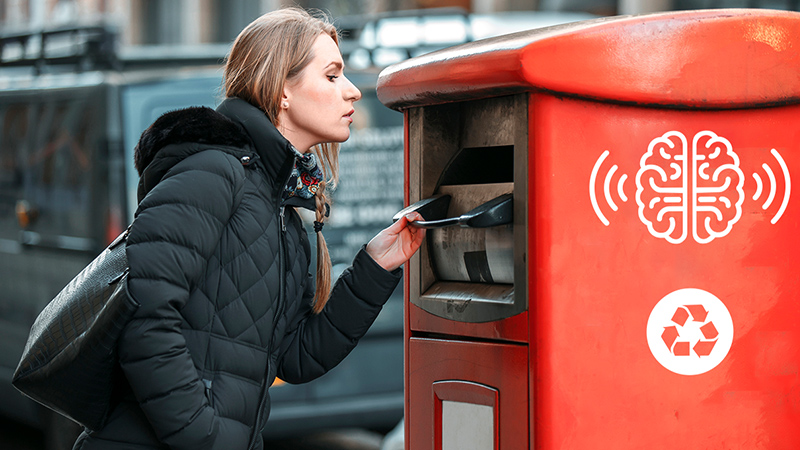Trash is a problem we can’t get rid of. As plastics pile up on remote beaches and India suffers a garbage glut, we are running out of space for our waste. And with less than 35 percent of trash getting recycled in the U.S., experts are hoping technology can help reduce waste and increase recycling.
Polish startup Bin-e, for instance, is aiming to improve recycling rates with a bin that uses sensors, image recognition, and artificial intelligence to sort your waste for you.
“It’s the key for reaching our global recycling goals and a circular economy,” says Jakub Luboński, Bin-e CEO and co-founder.
Other firms pushing smart bin concepts include Binology in Russia, Ecube Labs of South Korea, and SmartBin of Ireland. Mostly they use the Internet of Things to improve trash pickup rates, for instance using sensors to figure out when a bin is full. And making sure bins get emptied on time is more important than you might think.
Ecube Labs claims its smart bins improve waste collection efficiency by 50 percent or more. That can have a big impact by making sure garbage trucks only picks up full trash, rather than stopping to empty every bin on a long route.
That can help cut public spending on fuel costs and improve carbon footprints. It can also ease congestion on the streets, making for easier commutes for travelers.
“Anyone who has ever been stuck behind a slow-moving trash truck on a congested city street would certainly value better routing to match demand for trash pickup,” muses Steve Hilton, of the IoT testing and research firm MachNation.
The problem is, IoT alone won’t solve the problem of how to get people to recycle more. And sometimes it won’t even help much with garbage truck routing, says Mark Saunders, director of the Centre of Excellence for Cities at Ferrovial Services in the U.K.
See also: Meet distinguished engineer Carlos Pignataro
Saunders recounts talking to a U.K. city council about how to cut the cost of picking up waste. He told his client recycling rates were low in some parts of the city, so it didn’t make sense to waste money sending pickup trucks there as often as in places where the rate was higher.
Saunders says his client replied: “Yes, you’re absolutely right, but we can’t do that. We can’t set some kind of precedent that we want this part of the city treated differently to that part of the city.”
Problems like this have made Saunders see that many of the issues around garbage depends on people as much as technology. Hence, Ferrovial Services now views smart bins as just one piece of the puzzle when it comes to dealing with rubbish.
See also: IoT helps keep the Mideast cool
One other vital piece is getting into people’s minds. Ferrovial Services to come up with novel waste disposal concepts that have improved recycling rates.
In one project in London, U.K., Ferrovial Services got people living in a council block to recycle 38 percent more food waste simply by dressing a smart bin up as a frog-like alien, so it would attract more attention.
Elsewhere, the firm tackled recycling bin contamination in Slough, U.K., with an RFID system to unlock the bins. Technology solved the problem, but ultimately “it was a behavioral issue,” says Saunders.
“People were putting the wrong stuff in the wrong bin, leading to a higher cost.”
###
The contents or opinions in this feature are independent and may not necessarily represent the views of Cisco. They are offered in an effort to encourage continuing conversations on a broad range of innovative technology subjects. We welcome your comments and engagement.
We welcome the re-use, republication, and distribution of "The Network" content. Please credit us with the following information: Used with the permission of http://thenetwork.cisco.com/.




